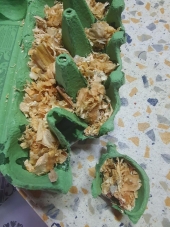Rebecca, I'm not sure of the size of your rocks, but they look like the basalt chunks that used to be used on the country railways as ballast to hold the tracks down in the heat. Years ago, I saw a former rail worker's cottage right next to the tracks in the NSW Central West that had a front garden covered with the black rocks. Making gabions sounds like an excellent use of them.
Sarah, your rocks look like mine at my Bulgarian house. The soil behind the house is full of them, there are lots of old drystone fences built of them, and since the ancient stone barn collapsed in a winter storm, I have a huge supply of similar stones. I hope to use mine to make low terraces on contour and slow the water flow in the sloping back yard.








